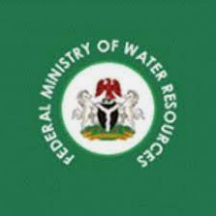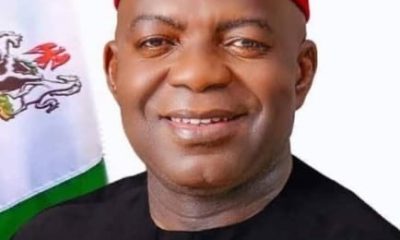BUSINESS
Nigeria Needs N6trn to Meet Demands on Water Infrastructure – Minister

The Minister of Water Resources, Mr Suleiman Adamu, says Nigeria needs not less than six trillion Naira to meet the demands for water supply infrastructure in the country.
Adamu said this at the 28th Regular Meeting of the National Council on Water Resources in Abuja on Tuesday.
The minster, who noted that major challenges facing the sustainable development of the water sector were funding, poor water governance, obsolete infrastructure amongst others.
He said the meeting was an opportunity to discuss developments in the water sector, evaluate issues, address identified challenges and chart a way forward towards resolving contemporary challenges.
Speaking on the theme, “Emerging Financial and Management Challenges for Sustainable Water Infrastructure in Nigeria”, Adamu said a review of water governance, sustainable financing, pricing for water services was being considered.
He said resolutions from the last council meeting saw the need for states to key into the current Partnership for Expanded Water, Sanitation and Hygiene (PEWASH) initiative of the Federal Government.
This, he noted, is being piloted in some states in a performance approach through the provision of separate budget line in the state rural agency of water supply and sanitation agencies.
He added that the World Bank had committed 700 million dollars to support Nigeria in its National WASH Action plan towards revitilisation of the sector through the Sustainable Urban and Rural Water Supply and sanitation Hygiene (SURWASH) programme.
“SURWASH is expected to provide six million people with basic drinking water services and 1.4 million people access to improved sanitation services.
“The programme will deliver improved WASH services to 2,000 schools and healthcare facilities and assist communities to achieve open defecation-free status’’.
Earlier, Mr Oumar Dombouya, UNICEF WASH Manager, said the 2019 National Outcome Routine Mapping of Water, Sanitation, and Hygiene Service Levels (WASH-NORM), showed that 30 per cent of the people in Nigeria (60 million people) do not have access to clean water.
He noted that UNICEF had been giving its support to change this narrative through Village Level Operation and Maintenance to improve functionality and sustainability of water facilities across the country.
Dombouya pledged the commitment of the UN body to support durable and cost effective interventions towards making the country meet its SDG target by 2030.
Dr Edwin Isotu-Edeh, National Consultant, Public Health and Environment, representing the WHO Nigeria Country Representative, said it was worrisome that one in three persons still lack access to basic drinking water globally.
He said there was need to democratise access to WASH services in the county, saying states must emulate what was being done in the federal level to ensure sustainability.
“States can emulate what was being done by the federal government, ad all stakeholders ought to put water as a key component of all interventions’’.
Mr Olusade Adesola, representative of the FCT Minister, Dr Mohammed Bello, said provision of clean and safe clean drinking water to FCT residents was top priority of the Federal Government through the FCT Administration.
He listed challenges of population explosion, inadequate funding amongst others, saying implementable policies were underway to address this need.
“The water sector is faced with old and emerging challenges that has prevented us from emerging our target in this sector, providing infrastructure for regular water supply is very capital intensive.
“While the projected population of the FCT by year 2020 ought to be 3 million, the actual population as at 2018 and 2019 had risen to six million, this has placed enormous demand and pressure on significant resources to meet the infrastructural need.
“That is why you see new territories, layouts, districts are being opened without the corresponding provision of infrastructural facilities’’.
Adesola said the work was ongoing to complete the greater Abuja Water Supply Project, saying it was a bilateral initiative to enhance water supply to 33 districts in the FCT.
He added that the administration was also carrying out activities to improve access to potable water supply for the FCT residents in partnership with the organised private sector. (NAN)
Oil & Gas
NNPC Ltd. Disclaims Fake Financial Scheme

The Nigerian National Petroleum Company Limited (NNPC Ltd.) has disowned a fake AI-generated video circulating on social media featuring a cloned voice of the Group CEO, Mr Bayo Ojulari, promoting a fictitious poverty alleviation scheme.
The Chief Corporate Communications Officer, NNPC Ltd.
, Olufemi Soneye in a statement on Thursday clarified that the company had no such investment initiative.Soneye urged the public to disregard the video, originally shared by an account named Mensageiro de Cristo on Facebook.
“NNPC Ltd. has warned the perpetrators to cease their fraudulent actions or face legal consequences,” he said. (NAN)
Economy
We’ll Continue Borrowing Within Sustainable Limits- FG

The Federal Government says it will continue to borrow within manageable and sustainable limits in accordance with the Debt Management Office (DMO) debt sustainability framework.
This is contained in a statement by the Director, Information and Public Relations in the Ministry of Finance, Mr Mohammed Manga, in Abuja on Wednesday.
President Bola Tinubu recently requested the approval of the 2024 – 2026 external borrowing rolling plan from the National Assembly.
Tinubu has requested the National Assembly’s approval to secure external loans of 21.5 million dollars and 15 billion Yuan, along with a grant of 65 million Euro, as part of the federal government’s proposed 2025–2026 external borrowing plan.
Manga said that the proposed borrowing plan was an essential component of the Medium-Term Expenditure Framework (MTEF) in accordance with both the Fiscal Responsibility Act 2007 and the DMO Act 2003.
“The plan outlines the external borrowing framework for both the federal and sub-national governments over a three-year period, accompanied by five detailed appendices on the projects, terms and conditions, implementation period, etc.
“By adopting a structured, forward-looking approach, the plan facilitates comprehensive financial planning and avoids the inefficiencies of ad-hoc or reactive borrowing practices.
“This strategic method enhances the country’s ability to implement effective fiscal policies and mobilise development resources,” he said.
According to the statement, the borrowing plan does not equate to actual borrowing for the period.
“The actual borrowing for each year is contained in the annual budget. In 2025, the external borrowing component is 1.23 billion dollars, and it has not yet been drawn.
“This is planned for H2 2025, the plan is for both federal and several state governments across numerous geopolitical zones including Abia, Bauchi, Borno, Gombe, Kaduna, Lagos, Niger, Oyo, Sokoto, and Yobe States.
“Importantly, it should be noted that the borrowing rolling plan does not equate to an automatic increase in the nation’s debt burden.
“The nature of the rolling plan means that borrowings are split over the period of the projects, for example, a large proportion of projects in the 2024–2026 rolling plan have multi-year drawdowns of between five to seven years which are project-tied loans,” Manga said.
He said that these projects cut across critical sectors of the economy, including power grids and transmission lines, irrigation for improving food security, fibre optics network across the country, fighter jets for security, rail and road infrastructure.
According to him, the majority of the proposed borrowing will be sourced from the country’s development partners, like the World Bank, African Development Bank, French Development Agency, European Investment Bank, JICA, China EximBank, and the Islamic Development Bank.
Manga said that these institutions offer concessional financing with favourable terms and long repayment periods, thereby supporting Nigeria’s development objectives sustainably.
He said that the government seeks to reiterate that the debt service to revenue ratio has started decreasing from its peak of over 90 per cent in 2023.
Manga said that the government has ended the distortionary and inflationary ways and means.
According to him, there is significant revenue expectations from the Nigerian National Petroleum Corporation Limited (NNPC Ltd), technology-enabled monitoring and collection of surpluses from government owned enterprises and revenue-generating ministries, departments, and agencies and legacy outstanding dues.
“Having achieved a fair degree of macroeconomic stabilisation, the overarching goal of the federal government is to pivot the economy onto a path of rapid, sustained, and inclusive economic growth.
“Achieving this vision requires substantial investment in critical sectors such as transportation, energy, infrastructure, and agriculture.
“These investments will lay the groundwork for long-term economic diversification and encourage private sector participation.
“Our debt strategy is therefore guided not solely by the size of our obligations, but by the utility, sustainability, and economic returns of the borrowing,” he said.(NAN)
The Federal Government says it will continue to borrow within manageable and sustainable limits in accordance with the Debt Management Office (DMO) debt sustainability framework.
This is contained in a statement by the Director, Information and Public Relations in the Ministry of Finance, Mr Mohammed Manga, in Abuja on Wednesday.
President Bola Tinubu recently requested the approval of the 2024 – 2026 external borrowing rolling plan from the National Assembly.
Tinubu has requested the National Assembly’s approval to secure external loans of 21.5 million dollars and 15 billion Yuan, along with a grant of 65 million Euro, as part of the federal government’s proposed 2025–2026 external borrowing plan.
Manga said that the proposed borrowing plan was an essential component of the Medium-Term Expenditure Framework (MTEF) in accordance with both the Fiscal Responsibility Act 2007 and the DMO Act 2003.
“The plan outlines the external borrowing framework for both the federal and sub-national governments over a three-year period, accompanied by five detailed appendices on the projects, terms and conditions, implementation period, etc.
“By adopting a structured, forward-looking approach, the plan facilitates comprehensive financial planning and avoids the inefficiencies of ad-hoc or reactive borrowing practices.
“This strategic method enhances the country’s ability to implement effective fiscal policies and mobilise development resources,” he said.
According to the statement, the borrowing plan does not equate to actual borrowing for the period.
“The actual borrowing for each year is contained in the annual budget. In 2025, the external borrowing component is 1.23 billion dollars, and it has not yet been drawn.
“This is planned for H2 2025, the plan is for both federal and several state governments across numerous geopolitical zones including Abia, Bauchi, Borno, Gombe, Kaduna, Lagos, Niger, Oyo, Sokoto, and Yobe States.
“Importantly, it should be noted that the borrowing rolling plan does not equate to an automatic increase in the nation’s debt burden.
“The nature of the rolling plan means that borrowings are split over the period of the projects, for example, a large proportion of projects in the 2024–2026 rolling plan have multi-year drawdowns of between five to seven years which are project-tied loans,” Manga said.
He said that these projects cut across critical sectors of the economy, including power grids and transmission lines, irrigation for improving food security, fibre optics network across the country, fighter jets for security, rail and road infrastructure.
According to him, the majority of the proposed borrowing will be sourced from the country’s development partners, like the World Bank, African Development Bank, French Development Agency, European Investment Bank, JICA, China EximBank, and the Islamic Development Bank.
Manga said that these institutions offer concessional financing with favourable terms and long repayment periods, thereby supporting Nigeria’s development objectives sustainably.
He said that the government seeks to reiterate that the debt service to revenue ratio has started decreasing from its peak of over 90 per cent in 2023.
Manga said that the government has ended the distortionary and inflationary ways and means.
According to him, there is significant revenue expectations from the Nigerian National Petroleum Corporation Limited (NNPC Ltd), technology-enabled monitoring and collection of surpluses from government owned enterprises and revenue-generating ministries, departments, and agencies and legacy outstanding dues.
“Having achieved a fair degree of macroeconomic stabilisation, the overarching goal of the federal government is to pivot the economy onto a path of rapid, sustained, and inclusive economic growth.
“Achieving this vision requires substantial investment in critical sectors such as transportation, energy, infrastructure, and agriculture.
“These investments will lay the groundwork for long-term economic diversification and encourage private sector participation.
“Our debt strategy is therefore guided not solely by the size of our obligations, but by the utility, sustainability, and economic returns of the borrowing,” he said.(NAN)
Economy
Organise Informal Sector, Tax Prosperity Not Poverty, Adedeji Tasks Officials

The Chairman, Joint Tax Board (JTB), Dr Zacch Adedeji, has urged officials of the board to organise traders and artisans into a formal body before capturing them in the tax net.
Adedeji said that this was in line with the agenda of President Bola Tinubu not to tax poverty but prosperity.
The chairman stated this at the 157th Joint Tax Board meeting held in Ibadan, on Monday.
The theme of the meeting “Taxation of the Informal Sector: Potentials and Challenges”.
Speaking on the theme of the event, Adedeji stressed the need to evolve a system that would make the informal sector formal before it could be taxed.
Adedeji, who also doubles as the Chairman, Federal Inland Revenue Service, (FIRS), said “What I would not expect from the JTB meeting is to define a system that would tax the informal sector.
“The only thing is to formalize the informal sector, not to design a system on how to collect tax from market men and women.
“As revenue administrator, our goal is to organise the informal sector so that it can fit into existing tax law.”
Citing a report of the National Bureau of Statistics (NBS) in the first quarter of 2023, the chairman said that the nation’s unemployment index was attributable to recognised informal work.
Adedeji stated that workers in that sector accounted for 92.6 per cent of the employed population in the country as at Q1 2023.
“JTB IS transiting to the Joint Revenue Board with expanded scope and functions.
“We are hopeful that by the time we hold the next meeting of the Board, the Joint Revenue Board (Establishment) Bill would have been signed into Law by the President.
“The meetings of the board provide the platform for members to engage and brainstorm on contemporary and emerging issues on tax, and taxation,” he said.
In his address, Gov. Seyi Makinde of Oyo State, said the theme of the meeting was apt and timely, stressing that it coincides with the agenda of the state to improve on its internally generated revenue.
According to him, the meeting should find the best way forward in addressing the issue of the informal sector and balance the identified challenges.
“Nigeria is rich in natural resources, but it is a poor country because economic prosperity does not base on natural resources,”
Makinde also said that knowledge, skill and intensive production were required for economic prosperity, not just the availability of natural resources.
He stressed the need to move from expecting Federal Allocations to generating income internally.
“We are actively ensuring that people are productive and moving the revenue base forward,” Makinde said.
The governor said that tax drive should be done by simplifying tax processes, incentives for compliance like access to empowerment schemes and loans.
He urged JTB to deepen partnership and innovation in using data on tax to track and administer it.
Earlier, the Executive Chairman, Oyo State Board of Internal Revenue, Mr Olufemi Awakan, said the meeting was to address tax-related matters, evolve a workable, effective and
efficient tax system across the states and at the Federal level.
He urged participants to find amicable solutions to challenges of tax jurisdiction, among others.
Tax administrators from all the 36 states of the federation, who are members of JTB, were in attendance. (NAN)

















